- Interpretation Of Quran / The long version
- /
- (002) Al Bakara
Al-Hajj is a major act of worship in Islam:
Dear brother, our lesson today is no. 67 of surat al-Baqarah, the ayah 96, Allah Almighty says,
"And perform properly (i.e. all the ceremonies according to the ways of Prophet Muhammad ), the Hajj and 'Umrah (i.e. the pilgrimage to Makkah) for Allah. "
Dear brother, having finished talking about fasting, we will start today with al-Hajj. There is a kind of harmony between the ayat( verses) in the Qur’an, and each surah (chapter) can form an entity since its ayat are connected closely to each other. As you remember, after mentioning the ayat which talk about fasting and how essential the du'a is during it,
"When My slaves ask you (O Muhammad) concerning Me I respond to the invocations of the supplicant"
[Surat Al-Baqarah: 186]Allah mentions the ayat (verses) about al-Hajj. We can deduce from those ayat that this act of worship is one of the major acts. Thus, when you start performing al-Hajj you should complete all of its rituals. This is exactly what makes it a major act of worship. Almighty Allah says,
"And perform properly (i.e. all the ceremonies according to the ways of Prophet Muhammad), the Hajj and 'Umrah (i.e. the pilgrimage to Makkah) for Allah. "
When Allah mentions al-Hajj, He connects it with al-Umrah. Language scholars said that conjunction necessitates connecting two things that are different from each other. So if these two conditions are not met ie (If the conjunction does not connect two different things to each other), its use is meaningless. Example, when you say, "Sa’id and Ahmad have come," you mean that both of them have come, and that Sa’id and Ahmad are two different persons. However, when you say, "Sa’id and Sa’id have come," you are talking about the same person, so the conjunction here has no function and it is meaningless.
Al-Hajj should be performed as an obligation and al-Umrah as a duty:
Therefore, Al-Hajj is one thing and al-Umrah is another. Although both of them are performed in the Inviolable House of Allah, 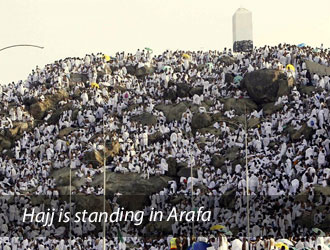 al-Hajj is performed in a specific period of time and in a certain place, and you should stand at Arafah when you perform it, while al-Umrah is performed anytime you want, and you do not have to stand at Arafah when you perform it. Allah says,
al-Hajj is performed in a specific period of time and in a certain place, and you should stand at Arafah when you perform it, while al-Umrah is performed anytime you want, and you do not have to stand at Arafah when you perform it. Allah says,
"And Hajj (pilgrimage to Makkah) to the House (Ka'bah) is a duty that mankind owes to Allah, those who can afford the expenses (for one's conveyance, provision and residence);"
Al-Hajj, as the ayah indicates, is an obligation for every capable Muslim; and that includes both the physical and financial ability.. We can conclude that al-Hajj is an obligation, whereas al-Umrah is a duty that all Muslims owe to Allah. There is a difference between al-Umrah and al-Hajj; al-Umrah is to pay a visit to the Inviolable House, whereas al- Hajj is to be performed in a specific period of time and in a certain place. It also requires that all Muslims should stand at Arafah. Almighty Allah considers al-Hajj "the Greater Hajj", so al-Umrah is the lesser one. Al-Hajj is an obligation, while al-Umrah is a duty. Muslims should complete all the rituals once they have started with them, for they are major acts of worship.
Al-Hajj and al-Umrah are ritual acts of worship. I mentioned in our sermon today that there are transactional acts of worship and ritual acts of worship. The difference between these two kinds is that you are rewarded with the transactional acts of worship in your worldly life, i.e. the reward is tangible. If a polytheist applies the Divine Method, he will definitely be rewarded in his worldly life. When you travel abroad, you will notice many things that draw your attention. You may find the majority there believe in Allah’s Method. They do their jobs properly and according to an accurate system. Their societies respect one’s freedom and punctuality. These two concepts are essential in Islam. Thus, a society that applies Allah’s Method in their transactions will be rewarded in the worldly life even if he does not believe in the Creator of this Method.
Acceptance of the ritual act of worship is based on the acceptance of the everyday one:
I told you earlier that there are two kinds of methods; the transactional method, and the ritual one.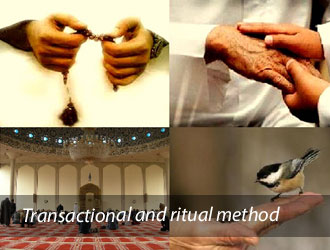 The transactional method means that you should be honest, trustworthy, just and always apply what is mentioned in Allah's Book. You should not harm your neighbor, backbite other people or commit adultery. If you apply the transactional method properly, you will be able to apply the ritual one in exactly the same manner. you should be aware of this truth; the ritual method is meaningless without the everyday one. let me give you an example; a person who earns his money illegally, lies to people, exploits them for his own interests, sells them bad goods and breaks his promises, is someone who violates the transactional method. If such a person wants to pray, he will be detached from Allah because the acceptance of his ritual act of worship is based on the everyday one. I repeat what I have said previously about al-Hajj; it is a ritual act of worship, Almighty Allah says,
The transactional method means that you should be honest, trustworthy, just and always apply what is mentioned in Allah's Book. You should not harm your neighbor, backbite other people or commit adultery. If you apply the transactional method properly, you will be able to apply the ritual one in exactly the same manner. you should be aware of this truth; the ritual method is meaningless without the everyday one. let me give you an example; a person who earns his money illegally, lies to people, exploits them for his own interests, sells them bad goods and breaks his promises, is someone who violates the transactional method. If such a person wants to pray, he will be detached from Allah because the acceptance of his ritual act of worship is based on the everyday one. I repeat what I have said previously about al-Hajj; it is a ritual act of worship, Almighty Allah says,
"And perform properly (i.e. all the ceremonies according to the ways of Prophet Muhammad), the Hajj and 'Umrah (i.e. the pilgrimage to Makkah) for Allah."
It means that you seek Allah’s Satisfaction. You should devote yourself to worshipping Allah, otherwise such act of worship is meaningless. Some people pretend to be honest in order to attract others’ attention and achieve their own interests. This is a well known method used by foreigners. They are honest, trustful, respectful, and perfect in doing their job. They are like that to achieve their own interests no more nor less.
The above mentioned manners are included in the transactional act of worship that even the polytheist will be rewarded for. The ritual act, on the other hand, has no interests in this worldly life. Performing al-Hajj requires spending money, bearing the hardships, forgetting about the hot weather, being patient when you are among a huge crowd of people and spending your time away from your family, relatives and job. Those who perform al-Hajj should be repentant, straight and should have earned their money legally, otherwise their Hajj is meaningless. A pilgrim who performs al-Hajj with illegal money, the minute he says, "Here I am at Your service O Lord, here I am. Here I am at Your service," he will be answered, "Your Hajj will not get you Allah’s Satisfaction because it is not accepted."
"And perform properly (i.e. all the ceremonies according to the ways of Prophet Muhammad), the Hajj and 'Umrah (i.e. the pilgrimage to Makkah) for Allah."
If you want your Hajj to be accepted, your money should be earned legally. Ninety percent of the straightness is got when your money is earned legally. Thus, the acceptance of your Hajj is based on the legitimacy of your money. A pilgrim’s Hajj cannot be accepted unless he gives other people their rights, asks for their forgiveness and pays back his debts.
The aforementioned ideas draw a decisive line between the everyday act of worship and the ritual one. If the former is not performed properly, the latter will not be accepted. Al-Hajj requires straightness, repentance, and giving others their rights. Only then Almighty Allah accepts your Hajj.
Al-Hajj is a financial, physical and ritual act of worship:
Allay says,
"And perform properly (i.e. all the ceremonies according to the ways of Prophet Muhammad), the Hajj"
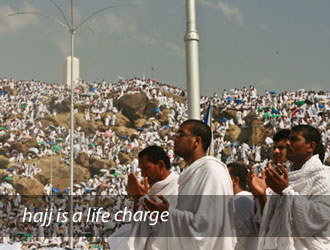 Someone may say that al-Hajj is the lifetime recharge, whereas fasting Ramadan is the annual boost, Friday sermon is the weekly one and the five prayers are the recharge between each one and the next. You need to nourish your body and your heart. You nourish your heart by acts of worship. You are revived by prayer, by the Friday sermon, by fasting in Ramadhan and by al-Hajj. Al-Hajj is something different because it is performed once in your lifetime, so it should be performed perfectly.
Someone may say that al-Hajj is the lifetime recharge, whereas fasting Ramadan is the annual boost, Friday sermon is the weekly one and the five prayers are the recharge between each one and the next. You need to nourish your body and your heart. You nourish your heart by acts of worship. You are revived by prayer, by the Friday sermon, by fasting in Ramadhan and by al-Hajj. Al-Hajj is something different because it is performed once in your lifetime, so it should be performed perfectly.
"And perform properly (i.e. all the ceremonies according to the ways of Prophet Muhammad), the Hajj and 'Umrah (i.e. the pilgrimage to Makkah) for Allah."
You dedicate all your time to al-Hajj. You pray and fast in your country, in your home with your wife and children and in your room. You perform these two acts of worship (fasting & prayer) where you live and where you work. Al-Hajj, on the contrary, is a unique act of worship; you should be totally devoted to it, leave your home, family, office, business and country, because you have to travel to a very far place and bear the burden of traveling and the expenditure of this journey. Al-Hajj is a financial, physical and ritual act of worship.
It is a financial act of worship, because it requires spending money, and it is a physical one, for it requires a strong body. I hope that all of you perform this act as soon as possible, because your body should be strong enough to bear the hard work there; circumambulation (Tawaf), running (Sa’yi) and standing at Arafat, Muzdalifah and Mina. I say it once again; al-Hajj is a financial, physical and ritual act of worship that requires a total devotion. You should be totally devoted to Allah; leaving your country, parents, family, money, business and clothes. You have to take off those clothes. People's clothes are not alike; their clothes show their societal distinctions. Some people wear very expensive clothes, but they should take off everything that makes them proud. All what you wear as a pilgrim are two simple pieces of cloth: unstitched and seamless white garment that is gathered around the shoulder (Rida’a) and the other piece covers the body from the waist down (Izaar). As for the shoes, a pilgrim wears sandals that do not cover the heels. He is not allowed to wear perfume nor cut his hair or fingernails. Allah reminds us of our last journey when we perform al-Hajj. We may call al-Hajj the journey that precedes the last one during which all people will be resurrected to meet Allah, the Lord of the worlds.
Muslim’s unity is manifested while performing the rituals of al-Hajj:
People in Arafat, whether rich, poor, strong or weak stand there wearing unified clothes and submit to Almighty Allah in a unified submission. 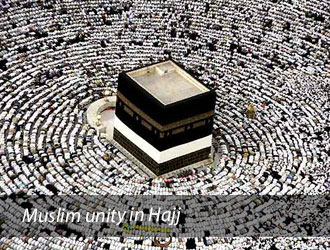 People are all alike in al-Hajj; even kings should take off their clothes and perform the rituals with the rest of the pilgrims. There are no first class places for people of high positions, no special circumambulation for kings, nor special running for the elite. Muslim’s unity is crystal clear while performing the rituals of al-Hajj. To wrap up, al-Hajj is a financial, physical, and ritual act of worship that necessitates a total devotion; leaving your country, homeland, family and friends. When you leave behind all these things, you should perform the rituals of al-Hajj. There is wisdom behind each ritual which no one realizes but those who feel it. Allah says,
People are all alike in al-Hajj; even kings should take off their clothes and perform the rituals with the rest of the pilgrims. There are no first class places for people of high positions, no special circumambulation for kings, nor special running for the elite. Muslim’s unity is crystal clear while performing the rituals of al-Hajj. To wrap up, al-Hajj is a financial, physical, and ritual act of worship that necessitates a total devotion; leaving your country, homeland, family and friends. When you leave behind all these things, you should perform the rituals of al-Hajj. There is wisdom behind each ritual which no one realizes but those who feel it. Allah says,
"And perform properly (i.e. all the ceremonies according to the ways of Prophet Muhammad), the Hajj and 'Umrah (i.e. the pilgrimage to Makkah) for Allah."
An order indicates the must, but in another ayah the must indicates an obligation. Allah says,
"And Hajj (pilgrimage to Makkah) to the House (Ka'bah) is a duty that mankind owes to Allah, those who can afford the expenses (for one's conveyance, provision and residence)"
"And whoever disbelieves," the scholars say that those who do not perform al-Hajj although they are able to, who deny such an act of worship, or who think that they do not need to perform al-Hajj to the Inviolable House of Allah, commit a kind of kufr. Allah says,
"And whoever disbelieves [i.e. denies Hajj (pilgrimage to Makkah), then he is a disbeliever of Allah], then Allah stands not in need of any of the 'Alamin (mankind and jinns). "
Prevention is of two kinds; the Divine prevention and the human one:
Allah says,
"But if you are prevented (from completing them)"
The order is, "And perform properly"
"But if you are prevented (from completing them)"
There are two kinds of prevention; the Divine prevention and the human one. Allah's Will is obvious when someone’s son, Allah forbid, falls down from the balcony and dies. However, if somebody drives his car quickly and kills a child in his way, the driver causes the death of the child. The Will is sent immediately by Allah, but the cause can be in the hand of a man. When something happened to you because of Allah’s Will, you cannot punish anyone for what happened to you. Yet, when there is a human cause then you can sue the person who causes you harm. Therefore, Allah says,
"And bear with patience whatever befall you. Verily! These are some of the important commandments ordered by Allah with no exemption."
Allah the Almighty also says,"And verily, whosoever shows patience and forgives that would truly be from the things recommended by Allah."
Sacrifice a Hady for Allah’s sake if you are prevented to complete the rituals of al-Hajj
The cause of Allah’s Destiny could be in the hand of someone. When you bear with patience Allah’s destiny, and forgive whoever Allah makes the cause of your disaster in his hand, this will truly be from the things Allah recommends. A pilgrim may be prevented from completing the rituals of al-Hajj by a Divine prevention such as; an earthquake, a flood, a plague, a dangerous illness or any other compulsory matter.
"But if you are prevented (from completing them)"
The reason could be Allah’s Will or a human cause, i.e. some people prevent you from performing al-Hajj just like when the Prophet, may Allah have peace and blessings upon him, was prevented at the time of al-Hudaibiyah. Thus, there are two kinds of prevention; a prevention done by Allah’s Will and the other one done by a human cause. Allah says,
"And perform properly (i.e. all the ceremonies according to the ways of Prophet Muhammad), the Hajj and 'Umrah (i.e. the pilgrimage to Makkah) for Allah."
When you are prevented from completing these rituals by Allah’s will or a human cause, here is the solution presented by Allah,
"But if you are prevented (from completing them), sacrifice a Hady (animal, i.e. a sheep, a cow, or a camel, etc.) such as you can afford,"
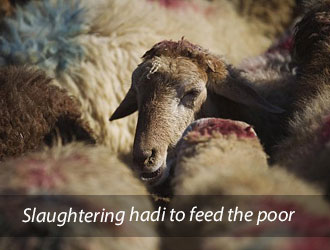 "Hady" is an animal (animal, i.e. a sheep, a cow, or a camel, etc.) you slaughter to feed the poor. Moreover, the Hady is presented as a metaphorical gift to Allah; you give it to Him in case you are prevented from completing the rituals. Once you slaughter it, you can take off your Ihram and get back home.
"Hady" is an animal (animal, i.e. a sheep, a cow, or a camel, etc.) you slaughter to feed the poor. Moreover, the Hady is presented as a metaphorical gift to Allah; you give it to Him in case you are prevented from completing the rituals. Once you slaughter it, you can take off your Ihram and get back home.
Allah says,
"Such as you can afford,"
It means that you either own enough money to buy a sacrifice animal or find the sacrifice animal itself. You may have the money but could not find the proper sacrifice animal or vice versa. The ability in the above mentioned ayah refers to either the money or the sacrifice animal. Someone may need medicine but does not have the money to buy it, or he may have the money but cannot find the medicine, so the meaning of the following ayah,
"Sacrifice a Hady (animal, i.e. a sheep, a cow, or a camel, etc.) such as you can afford,"
Is that you can either have the money to afford it or have the Hady itself.
Cutting the hair is one of the rituals of leaving the state of Ihram:
Every one of you knows that one of the rituals of leaving the state of Ihram is cutting the hair, Allah says,
"And do not shave your heads until the Hady reaches the place of sacrifice."
You have to make sure that the Hady is given to starving people. Do you know what was happening a few years ago? There were A million of pilgrims who slaughtered about five hundred sacrifices in Mina and they left them there under the burning sun. A friend of mine told me that the fetid smell of the decayed meat remained for many months. Is this what Allah wants us to do? Is it Allah’s Method to slaughter a sacrifice and keep it outside? Is it allowed according to Allah's Method to contaminate the air by its disgusting smell? Is this Islam? Nowadays, however, these sacrifices are slaughtered and put in fridges to be taken to poor people as gifts. Logically,this is what should be done. Allah says,
"And do not shave your heads until the Hady reaches the place of sacrifice."
Performing this ritual has a purpose; a sacrifice that is slaughtered should be eaten by the poor. When you slaughter a sacrifice and leave it on the streets you are not applying the ritual or the Divine Method. You are wasting money,
"And do not shave your heads until the Hady reaches the place of sacrifice.And whosoever of you is ill or has an ailment in his scalp (necessitating shaving), he must pay a Fidyah (ransom) of either observing Saum (fasts) (three days) or giving Sadaqah (charity - feeding six poor persons) or offering sacrifice (one sheep)."
If someone cannot cut his hair during the state of Ihram, what is he supposed to do? He either fasts three days, or feeds six poor people by giving them charity or offers a sacrifice. You see the ascending scale; you fast alone or feed six people by giving them charity. As for the sacrifice, you feed tens of people.
The difference between Hajj Ifraad, Hajj Qiran and Hajj Tamattu':
Dear brother, the meaning of Allah’s saying,
"And perform properly (i.e. all the ceremonies according to the ways of Prophet Muhammad), the Hajj and 'Umrah (i.e. the pilgrimage to Makkah) for Allah."
 is that if Allah’s Will or a human cause prevents you from completing the rituals, you are supposed to slaughter the sacrifice in the proper place and make sure that starving people will eat it. This is the essence of Islam; to draw closer to Allah by feeding starving people not by contaminating the air. Almighty Allah says,
is that if Allah’s Will or a human cause prevents you from completing the rituals, you are supposed to slaughter the sacrifice in the proper place and make sure that starving people will eat it. This is the essence of Islam; to draw closer to Allah by feeding starving people not by contaminating the air. Almighty Allah says,
"And whosoever of you is ill or has an ailment in his scalp (necessitating shaving), he must pay a Fidyah (ransom) of either observing Saum (fasts) (three days) or giving Sadaqah (charity - feeding six poor persons) or offering sacrifice (one sheep). Then if you are in safety and whosoever performs the 'Umrah in the months of Hajj, before (performing) the Hajj, (i.e. Hajj-at-Tamattu' and Al-Qiran)"
Scholars have different points of view about the answer of the following question; which is better to perform al-Hajj Ifrad and perform al-Umrah in another journey, i.e. to make two separated journeys; one for the rituals of al-Hajj and the other for al-Umrah, or to make one journey for both of them (al-Hajj and al-Umrah)? You know that according to al-Fiqh there are three forms of al-Hajj; Hajj Ifraad, Hajj Qiran and Hajj Tamattu'The Mufrad (derived from Ifrad. It refers to the pilgrim who performs this form of Hajj) is not supposed to slaughter a sacrifice, while the pilgrims of the other two forms are supposed to slaughter. The Qaarin (derived from Qiran. It refers to the pilgrim who performs Hajj Qiran) is the one who puts on Ihram during the rituals of al-Umrah and keeps it until the time of al-Hajj, so he completes the rituals of al-Hajj. By doing that he keeps himself in the state of Ihram and performs the rituals of both al-Umrah and al-Hajj. The Qaarin should work hard to complete these rituals, for he should keep himself in the state of Ihram if he comes ten days before performing the rituals of al-Hajj.
Unlike the pilgrims of the above mentioned forms of Hajj, al- Mutamatt'e puts on Ihram to perform the rituals of al-Umrah and then he takes off the Ihram until the eighth day of Dhul Hijjah to put on Ihram once again and continue the rituals of al-Hajj. What has he done in this case? He has performed al-Umrah, taken off Ihram, put it on once again and has performed al-Hajj. This pilgrim has to slaughter a sacrifice. Scholars said that the Hady of al- Mutamatt'e is obligatory, while the Hady of the Qaarin is the one of thanking Allah. The Qaarin slaughters a sacrifice to thank Allah for sustaining him and giving him physical strength to perform both al-Hajj and al-Umrah without leaving the state of Ihram between them.
To summarize the three forms of al-Hajj, we can say that there are Hajj Ifrad, which is to perform al-Hajj only, Hajj Qiran, which means that a pilgrim performs al-Umrah and then al-Hajj at the same time, and Hajj Tamattu', it is when a pilgrim assumes the state of Ihram to perform al-Umrah then leaves it, but on the eighth day of Dhul Hijjah he reassumes Ihram to perform al-Hajj. Al- Mutamatt'e and al-Qaarin are are supposed to slaughter the Hady. The Hady of al-Qaarin is to thank Allah, while the one of Al- Mutamatt'e is obligatory, because there is something missing in the rituals of al-Hajj that he performs. You can perform Hajj Ifrad without performing al-Umrah, so there is no need for the Hady. Also you can perform Hajj Ifrad, then perform al-Umrah that is separated from al-Hajj on the fifth day of Eid al-Addha. These are the possible choices that we have concerning al-Hajj and al-Umrah.
People who live in Mecca are not obliged to perform al-Umrah:
Allah says,
"Then if you are in safety and whosoever performs the 'Umrah in the months of Hajj, before (performing) the Hajj, (i.e. Hajj-at-Tamattu' and Al-Qiran), he must slaughter a Hady such as he can afford"
The pilgrim who assumes Ihram to perform al-Umrah, then leaves the state of Ihram and waits for the eighth day of Dhul Hijjah and reassumes Ihram to start with the rituals of al-Hajj, is called Mutamatt’e, i.e. he is obliged to slaughter a Hady, but if he cannot afford it;"But if he cannot afford it, he should observe Saum (fasts) three days during the Hajj and seven days after his return (to his home), making ten days in all."
There are always alternatives in Islam. It is Tashree’e (jurisprudence) for all people. If a pilgrim is poor and cannot afford a Hady, he can fast three days in Makkah and seven days when he gets back home,
"This is for him whose family is not present at Al-Masjid-al-Haram (i.e. non-resident of Makkah)."
This pilgrim is called an outsider; he lives far from the Inviolable House, whereas the one who lives in the vicinity of the House, is not obliged to perform al-Umrah. There is a map for al-Haram; there is the Inviolable House, al-Masjid al-Haram, its vicinity is called al-Haram, at-Tan'eem is in the south, and al-Ja'aranah is in another direction. All these places are called the vicinity of al-Haram. Also there are the Miqats (places where a pilgrim should enter the state of Ihram) of al-Hajj, and places which are not included in this Miqat; whoever lives in the vicinity of al-Haram is not obliged to perform al-Umrah. Why? Because he generally circumambulates around al-Ka’abah. The way you greet the Inviolable House is to circumambulate. When you go in al-Masjid you pray two rak’at as the greeting of al-Masjid, while entering the Inviolable House requires circumambulation instead. In brief, whoever lives in the vicinity of al-Haram does not have to perform al-Umrah.
The big difference between the obligatory Hajj and the voluntary Hajj:
Almighty Allah says,
"This is for him whose family is not present at Al-Masjid-al-Haram (i.e. non-resident of Makkah). And fear Allah much and know that Allah is Severe in punishment."
We can summarize this ayah as follows; al-Hajj is a major act of worship in Islam. It is obligatory for every Muslim who can perform it financially and physically. Obligatory means it should be performed.A person whose son will get married and needs money for his wedding can perform the recommended Hajj. The obligatory Hajj, however, should be the first priority. There is a big difference between the obligatory Hajj and the recommended one. Some pilgrims perform al-Hajj several times leaving their families in bad need of money. A Muslim leader can prevent those people from performing the recommended act of worship if it is done at the expense of something more important.
Allah says, "The Hajj and 'Umrah," there is a conjunction, i.e. they have something in common, but at the same time they differ from each other in few points. Like al-Hajj, al-Umrah is performed in the Inviolable House of Allah. Al-Hajj has particular period of time, place and rituals, whereas al-Umrah has rituals that can be performed at any time of the year. Besides, standing at Arafat is not required in al-Umrah.
"But if you are prevented (from completing them), sacrifice a Hady (animal, i.e. a sheep, a cow, or a camel, etc.) such as you can afford,"
You either have the money or the Hady,
"And do not shave your heads until the Hady reaches the place of sacrifice."
The sacrifice should be eaten by starving people.
Sexual talks are prohibited during al-Hajj:
Almighty Allah says,
"And whosoever of you is ill or has an ailment in his scalp (necessitating shaving), he must pay a Fidyah (ransom) of either observing Saum (fasts) (three days) or giving Sadaqah (charity - feeding six poor persons) or offering sacrifice (one sheep). Then if you are in safety and whosoever performs the 'Umrah in the months of Hajj, before (performing) the Hajj, (i.e. Hajj-at-Tamattu' and Al-Qiran), he must slaughter a Hady such as he can afford, but if he cannot afford it, he should observe Saum (fasts) three days during the Hajj and seven days after his return (to his home), making ten days in all. This is for him whose family is not present at Al-Masjid-al-Haram (i.e. non-resident of Makkah). And fear Allah much and know that Allah is Severe in punishment* The Hajj (pilgrimage) is (in) the well-known (lunar year) months (i.e. the 10th month, the 11th month and the first ten days of the 12th month of the Islamic calendar, i.e. two months and ten days). So whosoever intends to perform Hajj therein by assuming Ihram), then he should not have sexual
relations (with his wife), nor commit sin, nor dispute unjustly during the Hajj."
"Al-Hajj is in the well known month," these are Shawaal, Dhul Qi'dah and Dhul Hijjah.
"So whosoever intends to perform Hajj therein by assuming Ihram), then he should not have sexual relations (with his wife), nor commit sin,"
Any talk about women, sexual intercourse or any other sensual talk are considered sins.
What should a pilgrim look like?
Allah says,
"He should not have sexual relations (with his wife), nor commit sin,"
Nor commit a sin,"nor dispute unjustly during the Hajj."
Arguments and disputes are prohibited in the Hajj. You come from a very far place to visit the Inviolable House of Allah, so you should not be nervous because of the arguments and disputes you make in this holy place,
"And whatever good you do, (be sure) Allah knows it. And take a provision (with you) for the journey, but the best provision is At-Taqwa (piety, righteousness, etc.). So fear Me, O men of understanding!"
You should perform the most spiritual act of worship by doing righteous deeds. Those who push other pilgrims in order to be able to kiss the Black Stone, and who do no righteous deeds have no idea about the meaning of al-Hajj,"And whatever good you do"
Since you perform a very supreme act of worship, your deeds should be at a very supreme level too. You have to be patient, tolerant and generous,"And whatever good you do, (be sure) Allah knows it. And take a provision (with you) for the journey, but the best provision is At-Taqwa (piety, righteousness, etc.). So fear Me, O men of understanding!"
A pilgrim should have the expenses of al-Hajj:
A pilgrim should afford the expenses of al-Hajj instead of depending on other pilgrims. Some Shar’i rules indicate that a pilgrim who does not have the money to pay for the expenses for sleeping in Makkah or al-Madina is considered as not being able to afford the expenses of al-Hajj. He may sleep on the streets and his wife by his side uncovered at night; such behavior is not acceptable in al-Hajj. If you do not have enough money to pay the expenses of sleeping in a hotel in Makkah or in al-Madinah, you will never be able to afford the expenses of al-Hajj. You do not have to borrow money in order to pay the expenses of performing the rituals of al-Hajj; after all, this act of worship is obligatory for those who can afford its expenses. You do not have to beg people to give you money in al-Hajj, or be a burden to them. You should have enough money to perform al-Hajj and get back to your country, otherwise you are not supposed to perform al-Hajj.
"And take a provision (with you) for the journey,"
The journey is the one to perform al-Hajj, but
"but the best provision is At-Taqwa (piety, righteousness, etc.)"
Some people go there and do not have enough money, so they depend on the other pilgrims to give him money. Those people claim that they come to Makkah to perform al-Hajj, but actually they have no idea about the meaning of al-Hajj; they should know that this act of worship is a financial one and should be performed by those who can afford its expenses.
Having business after al-Hajj, does not mean your performance is not accepted:
Allah says,
So fear Me, O men of understanding! *
"There is no sin on you if you seek the Bounty of your Lord (during pilgrimage by trading, etc.)"
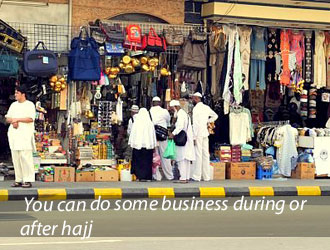 It means that if you have business that has nothing to do with the rituals of al-Hajj, you can do it. This business will not cancel your performance of al-Hajj. Similarly, those who have business after finishing the rituals of al-Hajj, are not affecting the acceptance of their performance.
It means that if you have business that has nothing to do with the rituals of al-Hajj, you can do it. This business will not cancel your performance of al-Hajj. Similarly, those who have business after finishing the rituals of al-Hajj, are not affecting the acceptance of their performance.
"There is no sin on you if you seek the Bounty of your Lord (during pilgrimage by trading, etc.). Then when you leave 'Arafat, remember Allah (by glorifying His Praises, i.e. prayers and invocations, etc.) at the Mash'ar-il-Haram. And remember Him (by invoking Allah for all good, etc.) as He has guided you, and verily, you were, before, of those who were astray."
The Mash'ar-il-Haram is a place where you should invoke Allah for all good,"And remember Him (by invoking Allah for all good, etc.) as He has guided you,"
That means a pilgrim will accomplish a great mission as he finishes performing al-Hajj.
"Then depart from the place whence all the people depart and ask Allah for His Forgiveness. Truly, Allah is Oft-Forgiving, Most-Merciful."
The rich in Makkah used to have a special place to depart before Islam, but it has been cancelled as the following ayah indicates,"Then depart from the place whence all the people depart"
Allah has selected a certain place, time and a special person to be always our exemplars:
Al-Hajj is the ultimate rank of submission to Allah Almighty. People who occupy high positions and want to perform it in order to have a distinctive social position will ruin the essence of al-Hajj. You have to take off all your lavish clothes, false masks and worldly ranks,
"Then depart from the place whence all the people depart and ask Allah for His Forgiveness. Truly, Allah is Oft-Forgiving, Most-Merciful*So when you have accomplished your Manasik [(i.e. Ihram, Tawaf of the Ka'bah and As-Safa and Al-Marwah), stay at 'Arafat, Muzdalifah and Mina, Ramy of Jamarat, (stoning of the specified pillars in Mina) slaughtering of Hady (animal, etc.)]. Remember Allah as you remember your forefathers or with a far more remembrance."
The main point about both performing al-Hajj and fasting Ramadhan is that what has been started in these two acts of worship should never be stopped when their periods of time end. Having finished performing the rituals of al-Hajj does not mean that you have to stop remembering Allah and thanking Him. Similarly, what you have done in Ramadhan should be continued in the other months of the year. Allah has selected this special month for you to fast but you should continue doing what you have started in it even after it ends, so the other months of the year should look exactly like Ramadhan. Likewise, Allah has selected this Holy place (The Inviolable House) where there are purity, submission, worshiping and invocation to make all other places similar to it; what you find in this particular place should be found in the Muslim world. Also Allah has selected Prophet Muhammad, may Allah have peace and blessings upon him, to be the master of all mankind and the exemplar for them all.
The following ayah shows that the father has a special position:
Allah says,
"So when you have accomplished your Manasik [(i.e. Ihram, Tawaf of the Ka'bah and As-Safa and Al-Marwah), stay at 'Arafat, Muzdalifah and Mina, Ramy of Jamarat, (stoning of the specified pillars in Mina) slaughtering of Hady (animal, etc.)]. Remember Allah as you remember your forefathers or with a far more remembrance."
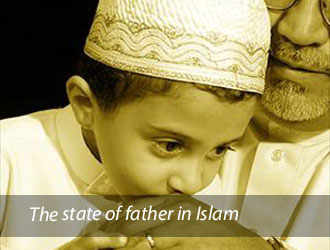 Notice how the above mentioned ayah shows that fathers have major roles. Allah wants to be remembered by His servants the same way they remember their fathers. The stronger the belief of man is the more honorable the father’s position is in the society, and the weaker the belief of man is the less honorable the father’s position will be.
Notice how the above mentioned ayah shows that fathers have major roles. Allah wants to be remembered by His servants the same way they remember their fathers. The stronger the belief of man is the more honorable the father’s position is in the society, and the weaker the belief of man is the less honorable the father’s position will be. "But of mankind there are some who say: "Our Lord! Give us (Your Bounties) in this world!" and for such there will be no portion in the Hereafter."
The worldly life for many people is all what they care about, but they will have no portion in the Hereafter."So, when they forgot (the warning) with which they had been reminded, We opened to them the gates of every (pleasant) thing, until in the midst of their enjoyment in that which they were given, all of a sudden, We took them to punishment, and lo! They were plunged into destruction with deep regrets and sorrows."
"And of them there are some who say: "Our Lord! Give us in this world that which is good and in the Hereafter that which is good, and save us from the torment of the Fire!"
You may be able to own the worldly life by your intelligence, but you will never own the Hereafter unless by worshiping. I mentioned earlier that Allah’s Method is an objective one; an atheist can be rewarded in the worldly life if he applies it. If you want to own the worldly life, you will be able to know every minute detail about it, but if you want to own the Hereafter you are obliged to worship Allah properly.﴾ For them there will be alloted a share for what they have earned. And Allah is Swift at reckoning. ﴿
Al-Hajj is meeting Allah:
Dear brother, no matter how many times you read these ayat and understand their interpretations, they remain pieces of information. You have to perform al-Hajj and apply all these ayat. Make du’a to Allah to help you perform al-Hajj to His Inviolable House. This act of worship is a major one which is diverse, constant, financial and ritual. If you perform it the way Allah orders, you will be in indescribable happiness with a long life charge.
Dear brother, sometimes you are shocked when you listen to a pilgrim who has finished the rituals of al-Hajj and got back home. He tells you about everything but al-Hajj; he tells you where he stayed, what he ate, how the air conditioning was, the cold fresh water, the streets, the arches, the Inviolable House of Allah, the lights and the loudness of the volume. He talks about everything except things that are related to the circumambulation, to Safa and Marwa and to the invocations at Arafat. Most of the pilgrims who are ignorant of the true meaning of al-Hajj will tell you about everything except al-Hajj.
Some of the pilgrims, on the other hand, tell you how they felt when they performed the rituals in a way that makes you yearn to perform al-Hajj as soon as you get the chance. Their talks make you wish to go there every year to feel that Allah welcomes you warmly and honors you to the greatest extent. You can imagine how you leave your home, wife, children, business, store, job, clothes and car in order to visit the Inviolable House. These people go on telling you about what they did during al-Hajj.
You go to Makkah as a man who no one knows, you perform the rituals of al-Hajj and spend a lot of money there, because everything is expensive; do you believe that you do all these things without being rewarded? "The one who stood at Arafat and he wasn't sure that Allah expiated his sins, his Hajj wouldn't be accepted." You cannot stand at Arafat without being rewarded. You may come by plane from a very far country, pay about two or three hundred thousand pounds for the ticket and travel around twenty or thirty hours to get to the Inviolable House. Can you imagine yourself unrewarded after doing all these things?
I once heard some pilgrims talking about the worldly life while they were standing at Arafat. How do you dare to talk about the worldly life or even fall asleep while you are at Arafat, where Allah calls you saying, "Come My servant, draw nearer to me," and you should answer Him, "Here I am at Your service O Lord, here I am."? Some people say that they took a mat to sleep. Is this what Allah has ordered you to do while performing al-Hajj? Can you go to a king and istand with your back to him? Or fall asleep? What a meeting is this? Al-Hajj is meeting Allah and it is Arafah. Sometimes you hear about things that happened in al-Hajj that are acceptable neither in Islam nor in logic. How can you hurt other people just so you can kiss the Black Stone? It is not acceptable to hit someone with your hand or kick the other with your foot in order to see the Black Stone. Some people are really ignorant of the true meaning of al-Hajj.
The days which follow standing at Arafat:
Dear brother,
"And of them there are some who say: "Our Lord! Give us in this world that which is good and in the Hereafter that which is good, and save us from the torment of the Fire! * For them there will be alloted a share for what they have earned. And Allah is Swift at reckoning. *And remember Allah during the appointed Days. "
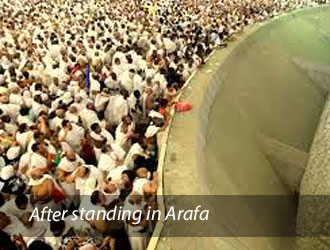 These days are the ones which follow the standing at Arafat, descending to Muzdalifah and throwing the Stone- Built Pillars, Jamarat al-Aqabah. Such ritual is performed in two or three days, when you throw the three Jamarat and perform some rituals,
These days are the ones which follow the standing at Arafat, descending to Muzdalifah and throwing the Stone- Built Pillars, Jamarat al-Aqabah. Such ritual is performed in two or three days, when you throw the three Jamarat and perform some rituals,"And remember Allah during the appointed Days. But whosoever hastens to leave in two days, there is no sin on him and whosoever stays on, there is no sin on him,"
You should stay in Mina and throw the three Jamrat ; the Greatest Jamarah of Al-Aqabah; the Middle Jamarah and the Smallest Jamarah.﴾ "If his aim is to do good and obey Allah (fear Him), and know that you will surely be gathered unto Him." ﴿




